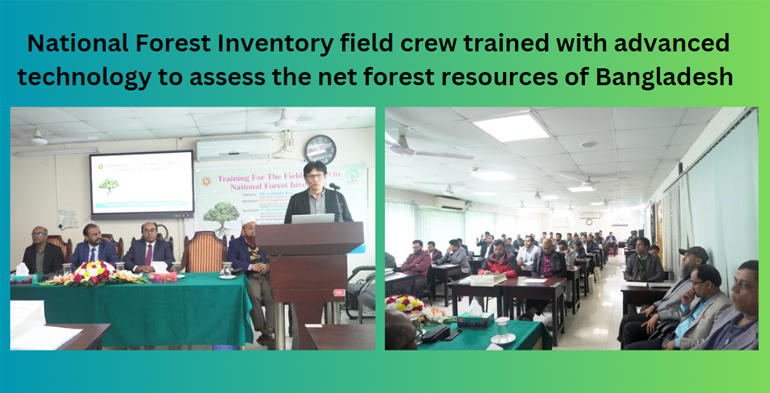
Agrilife24.com: The Food and Agriculture Organization of the United Nations (FAO) organized a training for the field crew of the National Forest Inventory who will be conducting surveys to assess net forest resources of Bangladesh. The trainees are introduced to advanced tools and technologies to maintain higher accuracy and consistency of the National Information System. Bangladesh will be the first country in Southeast Asia to use these advanced technologies for the forest inventory at the national level.
The 7-day training started at Sheikh Kamal Wildlife Center, Gazipur with the participation of Gobinda Roy, Project Director, SUFAL Project; Dr Dicky Simorangkir, Environment and Climate Change Specialist (Team Leader, EFCC Team), FAO Bangladesh; and Md. Moyeenuddin Khan Deputy Chief Conservator of the Forest- Social Forestry Wing on the first day. The program was presided over by Mohammad Sobeder Islam, Director, Sheikh Kamal Wildlife Center, Gazipur.
A group of well-skilled personnel from the Forest Department are selected to be trained ahead of the field visits for the forest inventory to be conducted by the Forest Department. The training is done on technical and scientific procedures of the process and the participants are introduced to the advanced technics and technologies with hands-on skills by the experts in this field.
Dr Dicky Simorangkir, Environment and Climate Change Specialist (Team Leader, EFCC Team), FAO Bangladesh said, “Sustainability requires the best technology and scientific approach; FAO is committed to supporting Bangladesh with advanced technology, skills, and know-how.”
Gobinda Roy, Project Director, SUFAL Project said, “Sustainable use of the forest resources can uplift the country’s economy and help protect our land. Assessment is the first and crucial step to take for protection and survival.”
Md. Moyeenuddin Khan, Deputy Chief Conservator of the Forest- Social Forestry Wing, “A data-driven forest monitoring is crucial for making the restoration efforts effective. We should join our forces together to protect our ecosystem and ensure its sustainable management.”
The complete inventory procedure is classified into two parts: Biophysical and Socio-economic Inventory; this training responds to the biophysical components of the forests. The field crew will learn to use tools following measurement techniques and assess the biophysical units scientifically. They learn profoundly by collecting field data using paperless tools, the latest instruments following highly accepted tactics.
Background
The National Forest Inventory will take place across the country by the Forest Department under the technical assistance of the Food and Agriculture Organization of the United Nations. Under this project, 1 858 sample plots in forests will be visited to assess the net forest resources and around 6 400 households will be surveyed to assess the community relation with forest in the country. Advanced tools and technologies will be introduced for the first time to maintain higher accuracy and consistency of the Forest Information System.
The training is under the Sustainable Forests and Livelihood (SUFAL) Project funded by the World Bank to accomplish the second cycle of the forest inventory at the national level. The main objective of the project is to strengthen the country’s existing information system, data collection, and archiving procedure. This training is expected to prepare a group of skilled people to strengthen the future skeleton of the Bangladesh Forest Department.





















